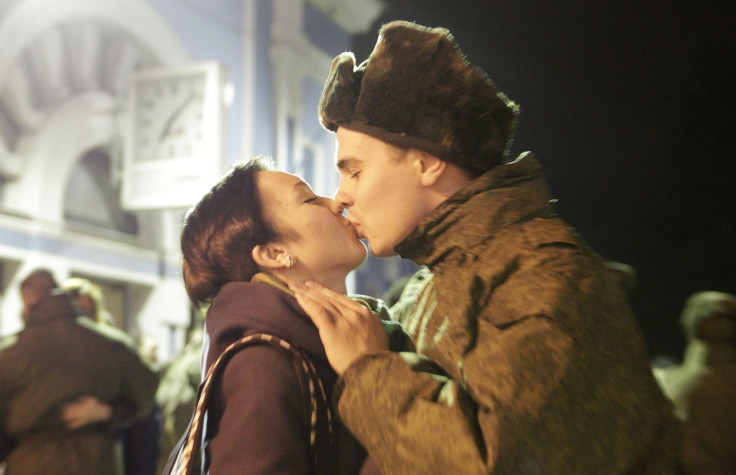Young Russians Dodge Draft More And More To Avoid Risk Of Fighting In Ukraine

Young Russians are dodging the draft in greater numbers than before for fear they will be sent to fight in the East Ukraine war, where Russia allegedly has increased its military involvement in recent months. A St. Petersburg-based human rights group, Soldiers’ Mothers of St. Petersburg, said Monday that it received a huge increase in calls during December and January from the families of young men who had turned 18 and were being called to service.
“Because of this war in Ukraine, conscripts are especially concerned,” said Igor Sutyagin, a Russian-born military analyst at the Royal United Services Institute think tank in London.
Officially, conscripts do not get sent to war; only soldiers who have signed up for longer terms, with so-called contracts, do. But that isn't stopping a rising trend of young men escaping the draft, Sutyagin said. “Even legal restrictions that prohibit conscripts going to war will not stop draft dodging, because many fear being forced to sign on as professional soldiers after their conscript year is over, which means they can be sent to war,” he said.
So far Russia has denied involvement in the East Ukraine war, which has claimed 5,000 lives since it began in April. NATO and several Western countries have said Russia is definitely assisting the pro-Russian rebels in Donetsk and Luhansk, regions in East Ukraine that share a border with Russia.
According to Soldiers’ Mothers of St. Petersburg, complaints about being forced to join the professional ranks have come from areas all over Russia, reported Kommersant, a liberal newspaper based in Moscow.
"My son was told by his command that he has to sign the contract but that it could later be annulled,” the father of a soldier serving in the village of Kamenka told Kommersant. “They explained that this was necessary because they needed to send him to the Rostov region for exercises, and [noncontract] conscripts can't be transferred to a different region for a prolonged period of time."
Alexander Peredruk, a spokesman for the Soldiers’ Mothers group, said the organization has appealed to the Russian prosecutor’s office and the Russian Ministry of Defense on the subject of forcing soldiers to join the professional army ranks, but hasn't received a response.
Russians have a long history of dodging the draft, through both world wars and more acutely during the 10-year Soviet war in Afghanistan that ended in 1989.
Twice a year Russia drafts 150,000 to 200,000 men between the ages of 18 and 27 to serve for 12 months. Today's conscripts have continued the tradition of avoiding military service in great numbers.
While exact figures are almost impossible to attain because they would embarrass the Russian government, Sutyagin said, traditionally around 50 percent of conscripts avoid the draft. A 2013 report from the General Staff of the Russian Federation Council mentioned that 244,000 men avoided conscription in 2012, although those figures could not be verified.
According to the report, 8,794 men who received draft cards did not turn up at the recruiting office. Another 235,800 avoided the draft by other means.
Maj. Gen. Alexander Nikitin, a department head at the Chief Military Prosecutor's Office, said around 30,000 people a year are convicted of offenses related to evading the draft. Draft dodging is punishable by up to two years in prison, and according to Nikitin around 1,000 people a year are convicted.
Russians have developed a number of creative and sometimes expensive ways to avoid the draft. A Time magazine article from 2009 told the story of a young conscript, “Dmitri,” who paid the equivalent of $2,500 to be certified mentally ill. Others forge their birth certificates or pay bribes. Often the best way is to have a doctor give a medical exemption, but that can cost as much as $10,000, which is well beyond the reach of many, noted the article.
Alexander Golts, an independent military analyst, told Time that "draft dodging is a national pastime” and a “million-dollar industry” in Russia. Incentives for joining are few. Most conscripts earn $10 a month.
Sutyagin, who was a reserve officer in the Russian military, said many conscripts fear the poor conditions and horrific hazing, which has long been the primary reason they dodge the draft when the country is not in a full-scale war. “Those that are serving a second year are senior to these first-year novices,” said Sutyagin, “and sometimes the new guys are just tortured." Deaths of conscripts over the last few years included hundreds of suicides.
The military reduced service from 18 months to 12 months in 2008 in an effort to combat draft dodging, but it has not worked, said Sutyagin.
The influence of the Afghan war, which is often referred to as the Soviet Union’s Vietnam, on the current crop of conscripts also cannot be understated. The war claimed the lives of nearly 15,000 Russian soldiers and resulted in a large degree of draft dodging during the 1980s, something that was known even at the time. More than 54,000 Russian troops were injured in total. Twenty-five years after that war ended, many of those maimed veterans are still around to tell young Russians what war is like.
And while the Kremlin has denied involvement in Ukraine, stories have begun to surface in the independent Russian press. Mikhail Laptev, a former Russian soldier who traveled to Ukraine to fight for the self-proclaimed separatist Luhansk People's Republic, explained to Kommersant how he lost his leg in battle after being fired on by a Ukrainian tank. "It's very scary there," Laptev said. "For those who want to go there to join, I don't recommend it. It's very scary."
© Copyright IBTimes 2024. All rights reserved.






















